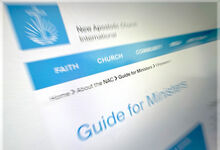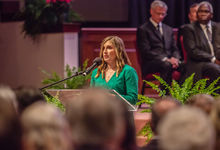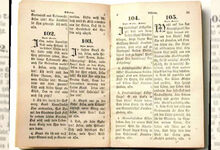A sign of God’s consistent care
Since today, liturgy is literally an open book in the New Apostolic Church: all prescriptions for divine services can now be found on nak.org, the official website of the Church.

The term “liturgy”, which derives from the ancient Greek word leiturgeia (“public service”), denotes the prescribed sequence of the divine service, as well as the words, actions, and gestures it involves. But why do we need something like this in the first place?
“People tend to think that the liturgy was prescribed so that there is order and that things are the same everywhere. The real purpose, however, is something entirely different,” Chief Apostle Jean-Luc Schneider explained a while ago. “The liturgy, because it is always the same, is a sign to the faithful that God is reliable: ‘See, no matter what happens in your life, no matter what happens on earth, I am the Lord and I do not change. I am here.’”
Changing tradition
This means that liturgy is as much a part of Christianity as the Amen we say in church. Indeed, this expression of affirmation is one of the oldest liturgical formulae documented in the New Testament.
The specifics of the structure and sequence of a divine service are characterised by the particular time and its circumstances. The New Apostolic tradition ranges from the liturgy book of the Catholic Apostolic Church (1843) to the so-called Stechmann liturgy (1864) and the Wachmann liturgy (1895) to the most recent liturgical reform in the years 2010 to 2020.
One step at a time
During these ten years, specifications for New Apostolic divine services were published step by step. In 2010, 2013, 2015, and 2020 four separate volumes of the Divine Service Guide for ministers were published on the subject.
Apart from the fact that these publications had all been written by changing groups of authors, a lot had happened in the meantime. In 2012, the Catechism was published as the most comprehensive presentation of the New Apostolic doctrine to date. To this end, our definition of ministry was analysed and revised more fundamentally than ever before.
Pieced together
With this in mind, the Divine Service Guide working group was asked to bring together and harmonise the previous prescriptions and order of worship. “The adaptations mainly concern the following points,” the Chief Apostle writes in a circular to the Apostles.
- uniform language
- adaptation to the Catechism and our new concept of ministry
- omitting of canon law aspects (Guide for Ministers)
- explanations on Holy Sealing and ordination
Noteworthy too about the last point is the fact that this is the first time that the liturgical requirements for acts which are reserved solely for the ministerial authority of an Apostle are publicly documented.
Online and available for download
Liturgy of the New Apostolic Church is the name of the new publication. It covers everything from divine services with their usual elements to special forms such as services for the departed, the dedication and decommissioning of churches, as well as weddings and funerals. The dispensation of the sacraments and acts of blessing have been given their own chapter, as have acts in connection with ministry and service.
The complete text—as well as the Catechism of the New Apostolic Church and the Guide for Ministers—can be found online at nak.org, the main website of the New Apostolic Church International. It is also possible to download a 99-page PDF file containing photos to illustrate the acts.
For now the book is available in English, French, and German. The Spanish translation is still in progress. Other languages will be made available by the District Apostle Areas themselves.
Photo: Oliver Rütten











